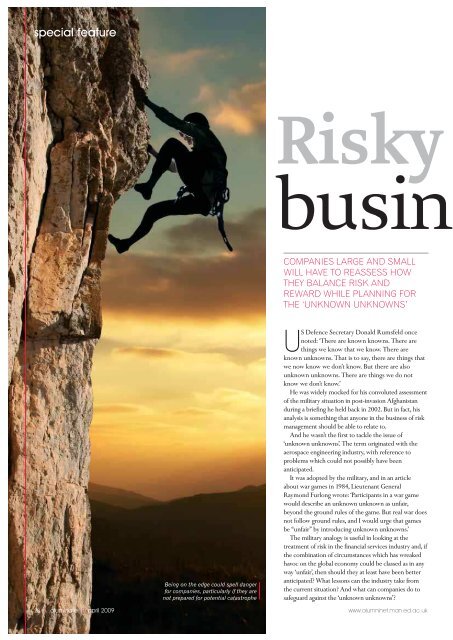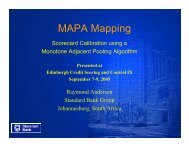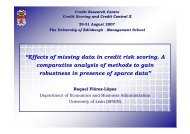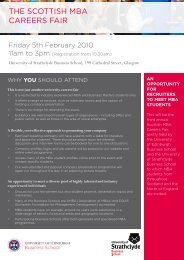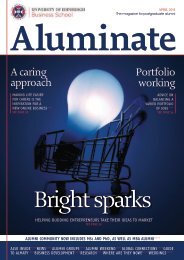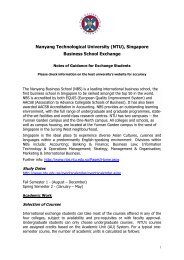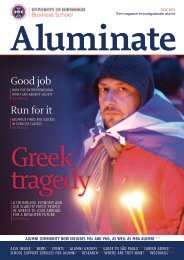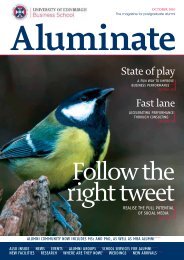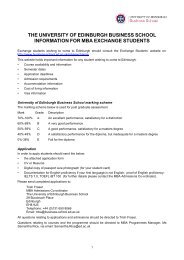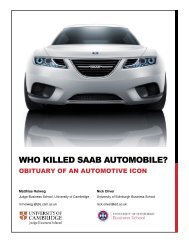to thewind? Caution - University of Edinburgh Business School
to thewind? Caution - University of Edinburgh Business School
to thewind? Caution - University of Edinburgh Business School
You also want an ePaper? Increase the reach of your titles
YUMPU automatically turns print PDFs into web optimized ePapers that Google loves.
special featurespecial featureRiskybusinessBeing on the edge could spell dangerfor companies, particularly if they arenot prepared for potential catastropheCOMPANIES LARGE AND SMALLWILL HAVE TO REASSESS HOWTHEY BALANCE RISK ANDREWARD WHILE PLANNING FORTHE ‘UNKNOWN UNKNOWNS’US Defence Secretary Donald Rumsfeld oncenoted: ‘There are known knowns. There arethings we know that we know. There areknown unknowns. That is <strong>to</strong> say, there are things thatwe now know we don’t know. But there are alsounknown unknowns. There are things we do notknow we don’t know.’He was widely mocked for his convoluted assessmen<strong>to</strong>f the military situation in post-invasion Afghanistanduring a briefing he held back in 2002. But in fact, hisanalysis is something that anyone in the business <strong>of</strong> riskmanagement should be able <strong>to</strong> relate <strong>to</strong>.And he wasn’t the first <strong>to</strong> tackle the issue <strong>of</strong>‘unknown unknowns’. The term originated with theaerospace engineering industry, with reference <strong>to</strong>problems which could not possibly have beenanticipated.It was adopted by the military, and in an articleabout war games in 1984, Lieutenant GeneralRaymond Furlong wrote: ‘Participants in a war gamewould describe an unknown unknown as unfair,beyond the ground rules <strong>of</strong> the game. But real war doesnot follow ground rules, and I would urge that gamesbe “unfair” by introducing unknown unknowns.’The military analogy is useful in looking at thetreatment <strong>of</strong> risk in the financial services industry and, ifthe combination <strong>of</strong> circumstances which has wreakedhavoc on the global economy could be classed as in anyway ‘unfair’, then should they at least have been betteranticipated? What lessons can the industry take fromthe current situation? And what can companies do <strong>to</strong>safeguard against the ‘unknown unknowns’?According <strong>to</strong> Carolyn Williams, Development Managerat the Institute <strong>of</strong> Risk Management, recent events shouldact as a wake-up call for the industry.‘Some businesses get so engrossed in the mathematics<strong>of</strong> trying <strong>to</strong> model what their risks might be, particularlyin the financial services side, that they don’t look up at thewider things going on in the world,’ she said.‘It’s a matter <strong>of</strong> opening your eyes <strong>to</strong> what’s going on andapplying common sense, as well as the detailed crunchingtype <strong>of</strong> risk management which everybody has <strong>to</strong> do.‘I think there’s a whole rethink <strong>of</strong> the risk managementprocess going on. People are certainly going <strong>to</strong> try <strong>to</strong> do itbetter, and they’re going <strong>to</strong> be more in the spotlightbecause <strong>of</strong> what’s happened. So they have <strong>to</strong> be veryconfident that what they’re doing meets the bestindustry standards.’But even if the risk manager is doing the job <strong>to</strong> the bes<strong>to</strong>f their abilities, is there any guarantee that their messageis getting through <strong>to</strong> the appropriate level?Paul Moore, the former Head <strong>of</strong> Group Regula<strong>to</strong>ry Riskat HBOS, gave evidence <strong>to</strong> the Treasury selectcommittee’s hearing in<strong>to</strong> the financial crisis in February,having said that: ‘Being an internal risk and compliancemanager… felt a bit like being a man in a rowing boattrying <strong>to</strong> slow down an oil tanker.’Moore said he <strong>to</strong>ld HBOS it was ‘going <strong>to</strong>o fast, had acultural indisposition <strong>to</strong> change and was a serious risk <strong>to</strong>A TIMELINE OF RISK REGULATION1992:The Financial Aspects <strong>of</strong>Corporate Governance,otherwise known as theCadbury Report, is publishedand applies <strong>to</strong> all listedcompanies reporting theiraccounts from 30 June 1993.1999:Internal Control: Guidance forDirec<strong>to</strong>rs on the CombinedCode, known as the TurnbullGuidance, is issued andupdated in 2005.financial stability and consumer protection’. He wasdismissed in 2005 and sued HBOS. His claim was settled,but he was subjected <strong>to</strong> a gagging order, which he onlybroke in order <strong>to</strong> give his evidence <strong>to</strong> the select committee.HBOS bosses Andy Hornby and Lord Stevenson deniedMoore’s claims at the hearing. But the allegations led <strong>to</strong>Hornby’s predecessor at HBOS, Sir James Crosby, quittinghis position as deputy chairman <strong>of</strong> the Financial ServicesAuthority, though he also said Moore’s allegations had nomerit. The FSA said it had had concerns about riskmanagement at HBOS dating back <strong>to</strong> 2002.Crawford Paul (Class <strong>of</strong> 1981), Direc<strong>to</strong>r <strong>of</strong> the insurancebroker Coverall Worldwide, said that it’s clear from suchexamples that the area <strong>of</strong> risk management needs <strong>to</strong> begiven more respect.‘There has <strong>to</strong> be a broader appreciation <strong>of</strong> what riskactually is and its status should be elevated <strong>to</strong> thecompany board room, be more broadly defined and not,as has traditionally happened, left <strong>to</strong> the insurancemanager,’ he said.‘<strong>Business</strong>es need <strong>to</strong> revisit risk and build it more in<strong>to</strong>their business plans. They should take a look at theirskill sets, in each <strong>of</strong> the different areas <strong>of</strong> their business.They need <strong>to</strong> have people talking across the company,rather than just up and down it and look at <strong>to</strong>talenterprise risk and the interdependencies.’ Dr DavidHillson, Direc<strong>to</strong>r <strong>of</strong> the international risk consultancy2002:Sarbanes-Oxley Act comesin<strong>to</strong> force for US-listedcompanies, in the wake <strong>of</strong>the Enron and WorldComcorporate and accountingscandals.2003:The Combined Code onCorporate Governance isintroduced by the FinancialReporting Council for listedcompanies in the UK, and iscurrently under review.‘THERE’S A WHOLERETHINK OF RISKMANAGEMENTGOING ON. PEOPLEARE GOING TOHAVE TO DO ITBETTER AND AREGOING TO BEMORE IN THESPOTLIGHT NOWCarolyn Williams20 | aluminate | april 2009www.alumninet.man.ed.ac.ukwww.alumninet.man.ed.ac.uk april 2009 | aluminate | 21


